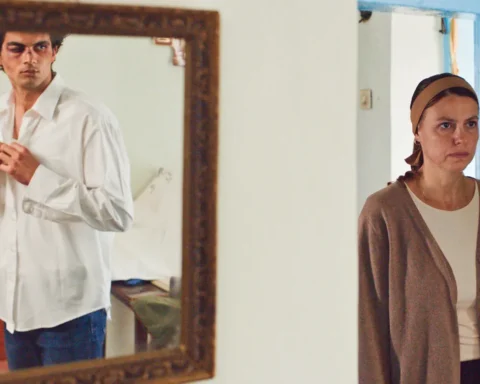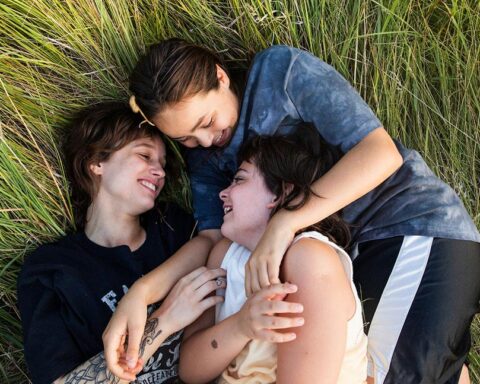Boiling Point (2021)
In his second feature yet, Philip Barantini takes his audience on a claustrophobic journey with Boiling Point, this time on Christmas night in one of London’s high-end restaurants. And the feature Boiling Point is the successfully adapted version from his 22-minute short film with the same title, shot in 2019 with the same crew.
The movie begins with Chief Andy’s phone call arguing with his family. He is already late for his own restaurant and when he arrives there, surely he won’t be welcomed well by the angry assistant chef and the crew. Moreover, the food inspector there has just finished his inspection and already taken away two stars of the restaurant as a result of: a perfect start to the busiest night of the year, isn’t it! The only reason the restaurant has been doing so well for the past few weeks is that Carly, the best 2. Chef, tries to run things in Andy’s absence anyway. But the problems are not over yet; Andy is caught in a high-tension conflict with the team and he cant help projecting his anger on them. Moreover the team is not at their best; communication problems arise with the language-challenged rookie, the night’s reservation list is over-booked. Also the customers have not even started to come in yet. All this is just the beginning of things heating up in the kitchen and an early indication that things are going to get worse at the restaurant tonight.
The nightmare is just about to begin with the arrival of the customers; where the tension spreads from behind the kitchen counter to the inside of the restaurant. Anyway the restaurant is considered to be a place that consists of two sides, right? On one hand the kitchen, where all is prepared and on the other hand the customers, who are the receivers of the courses ready. It soon becomes clear that there are quite a lot issues in the kitchen as well; pantry supplies are lacking, orders are not recorded correctly in the system (there is also a huge tension between the lazy garrotero, Beth and the rest of the staff). Considering all this, the query is now that: At which side of the kitchen will Chekhov’s pistol explode; the kitchen or the restaurant?
“There is nothing worse than serving hungry people.” says director Barantini, who spent 12 years in the service industry before moving on to filmmaking. And to prove it, he changes the focus from the kitchen to the restaurant in the second half of the movie. Naturally, the restaurant will not mean the same for the customers who usually come for a pleasant meal and for the the kitchen employees in the background who have to present everything in the shortest possible time in the most perfect way possible. When it comes to take on the role of the waitress, they will have to leave all the other hats in their lives in the cloakroom behind the scenes; even stress, distress, anger, pain or disappointment should return the customer with a smile, interest and care (even if fake). These are hidden behind a polite smile, but on the other hand the irritating and possibly upper-class customers think that they should receive special treatment from the working-class waiters: a waiter has to put up with a racist clientele declaring themselves wine experts, a group of Influencers insists on ordering steaks and chips which is not on the menu. Young couple hoping to celebrate an engagement having peanut allergies, a bunch of girls who really just want to get drunk are drooling; most of the upper class prototypes of society are present here. What’s more, Andy’s former boss, arrogant celebrity chef Alistair Skye, adds another layer to the issues at the restaurant by coming in with a notorious food critic. So, where the feeling of “suspense” gradually increases as the ambient temperature approaches the boiling point; on which table did Hitch, sorry Barantini place the bomb in this tense environment?
But the time of the explosion has not yet come. The director throws the camera out a few times to give the audience a break to breath in this long single shot, chasing after the employee who takes out the garbage, or the restaurant manager who argues with the assistant chef and ends up crying in the toilet. In this “the calm before the storm” moment, the audience’s pulse seems to return to normal for a few minutes.
Not after so long a bomb explodes when the young bride have an anaphylaxis and things soon take a turn for the worse for the restaurant. Ambulance arrives for treatment luckily in time, a reliving moment, but Andy has to find the culprit in the background. This effort causes though nothing more than another crisis within the team, and as the discussion turns to physical violence, Andy is forced to separate them. At the same time he has to repel Alastair, who is trying to take advantage of the situation (Alastair had offered him to be the joint chef of the restaurant in exchange for Andy’s debt that he cannot repay).
Andy, who has been on a knife-edge since the beginning of the movie, finally accepts that he will not be able to avoid the burdens in his private life or the setbacks in his business life. Which in the end of course will cause him abandon his sinking ship. He enters one of the rooms at the back of the building, giving himself up to alcohol and drugs, which he is already addicted to. As he leaves the room, he falls to the ground clutching his chest and possibly has a heart attack and the movie ends. Except perhaps the third episode where the drama gets exaggerated in intensity, here is the weak belly of the movie; an unexpected ending that seems a too easy-going or a compelling one?
Jean-Luc Godard said that there was nothing more interesting than filming working people; Barantini, on the other hand, enriches it by compressing it into almost a single space in a single plan. And it’s not just a bogus single scheme like Birdman (2014), nor are there any tricky hacks or edit points! In this context, it successfully overcomes fundamental technical difficulties just like Viktoria (2015) and Russian Ark (2002) did quite as well.
The attention of the audience, who is out of breath in front of the screen, is at its peak as the camera moves around and rotates in the restaurant, following the characters in a narrow physical space with its erratic movements and speed. The camera does not specifically focus on a single character or event, it glides in a natural way, as if in a documentary. Probably the greatest technical achievement pf Boiling Point is that sense of spontaneity; the dialogues in the movie seem spontaneous and just flow as in the daily life situations. Almost no moment in the movie is compelled or unnecessary. When this is accompanied by great acting, you come across an amazing seventh work of art that makes you forget that you are watching a fiction. Moreover, 8 shoots was actually planned but due to the Covid only 4 were ultimately made. Taking into account the pressure of a single plan on it, it is really hard to imagine how much preparation and rehearsal was done before the film, an absolutely magnificent team achievement.
Premiered at the Karlovy Vary festival in August 2021 and having (so far) 14 nominations and 5 awards (including 4 BAFTA nominations) Boiling Point proves well that it is one of the productions that should not be missed.
Where did I see it: Films by The Sea IFF, Vlissingen, Netherlands
Nil Birinci









